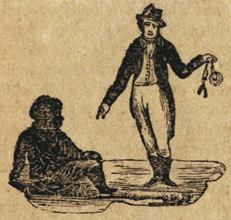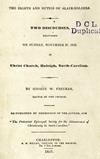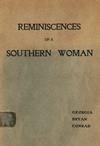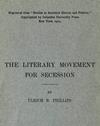Perspectives on Slavery and Secession: Highlights from The American Slavery Collection, 1820-1922

Is slavery justified by the Bible? Is slavery an un-Christian institution or a commercial necessity? In early 19th-century America the answer to such questions depended on whom you asked. The initial release of The American Slavery Collection, 1820-1922: From the American Antiquarian Society includes not only examples of these differing perspectives, but also retrospective accounts of both slavery and the secession movement.
The Rights and Duties of Slave-holders: Two Discourses, Delivered on Sunday, November 27, 1836, in Christ Church, Raleigh, North Carolina (1837)
By George Washington Freeman

Using the Bible to justify slavery, George Freeman describes the practice as a penal consequence of original sin. He rationalizes it as part of a patriarchal system in which ambitious and intelligent people oversee the lazy and slow-witted. Using scripture, he argues, “the bondage…was perpetual—they were regarded as the absolute property of their masters, and might…be sold and transferred as such.”
Reminiscences of Levi Coffin, the Reputed President of the Underground Railroad: Being a Brief History of the Labors of a Lifetime in Behalf of the Slave, with the Stories of Numerous Fugitives, Who Gained Their Freedom through His Instrumentality, and Many Other Incidents (1880)
By Levi Coffin

Levi Coffin was an abolitionist who played a major role in the success of the Underground Railroad; in fact, his home was referred to as the Railroad’s “Grand Central Station.” Coffin also turned to religion to support his position, saying, “What I had done I believed was simply a Christian duty and not for the purpose of being seen of men, or for notoriety, which I have never sought.”
Cotton Is King: Or the Culture of Cotton, and Its Relation to Agriculture, Manufactures and Commerce; To the Free Colored People; and To Those Who Hold That Slavery Is in Itself Sinful (1855)
By David Christy

Rather than treating slavery as a religious or moral quandary, David Christy examines the economic aspects of slavery, focusing on the production and trade of cotton. Christy argues that slavery is integral to international commerce and improves the overall condition of mankind by lowering the cost of products. He writes, “Slavery is not an isolated system, but is so mingled with the business of the world, that it derives facilities from the most innocent transactions.” Through “the manufacture of cotton,” he continues, “….mankind are better clothed; their comfort better promoted; general industry more highly stimulated; commerce more widely extended; and civilization more rapidly advanced, than in any preceding age.”
Reminiscences of a Southern Woman (1900)
By Georgia Bryan Conrad

Slavery apologist and daughter of a rice plantation owner, Georgia Bryan Conrad gives a firsthand account as a child whose world, in her words, has been turned upside down by the Civil War. According to Conrad, prior to the war, “The old slave was politeness personified, the men particularly. The house servants had a courtliness of manner borrowed from their masters that was striking. The women never entered a room without curtsying…” But now, she continues, “…Negro men and women take the inside of the sidewalk.…When will the Negro of to-day understand that freedom does not necessarily mean rudeness…”
The Literary Movement for Secession (1914)
By Ulrich B. Phillips

Writing fifty years after the Civil War concluded, Ulrich Phillips presents an interesting retrospective on the arguments in favor of secession. Phillips dismisses the position of the “official vindicators of the South” that the war was primarily for state rights, and turns instead to pamphlets written by private citizens as “probably the truest index to the prevalent thought of the community.”
For more information about The American Slavery Collection, 1820-1922, or to request a trial for your institution, please contact readexmarketing@readex.com.



